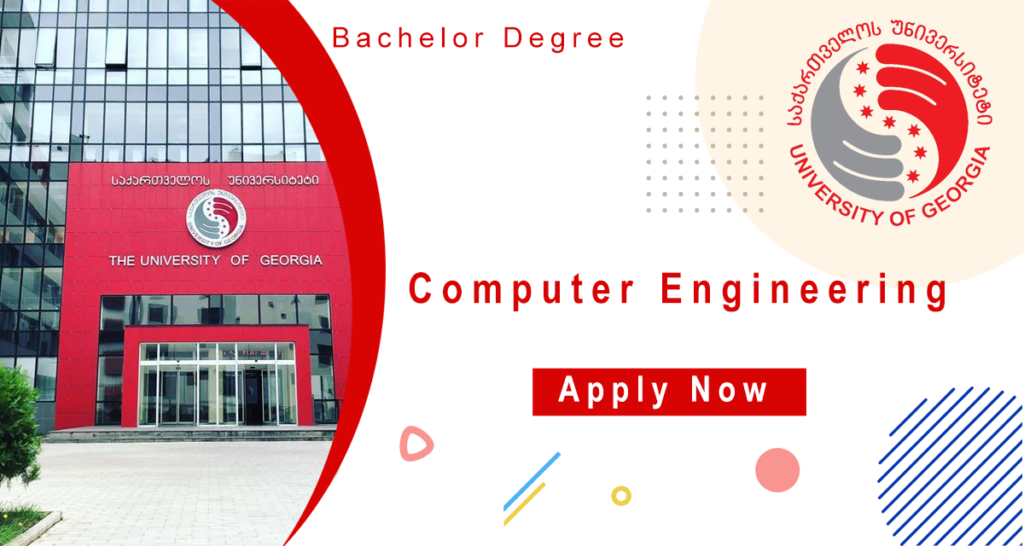University logo:

Program name: Engineering (Computer Science)
University name: University of Georgia
Faculty: School of Science and Technology
Program supervisor: Tavzarashvili Kakhaber –Ph.D, Associate Professor
Web-page: https://www.ug.edu.ge/
University address: 77a, M. Kostava Str. Tbilisi 0171, Georgia
Representative email: enroll@orientcities.com
Engineering Program Overview
The goals of the program are to provide quality general education in engineering, well-grounded in the fundamental principles of science, mathematics, and engineering; to foster innovation; to develop the ability to analyze, synthesize, and design electrical and computing systems; After graduating student will be able to write some codes for engineering problems, do some measurements and tests by using of knowledge in general physics, mathematics, statistics, will be able to design and analyze some analog and digital circuits, antennas. He will be able to design, analyze and solve problems concerning computer networks (Cisco CCNA).
Methods for Attaining Learning Outcomes:
Methods for achieving knowledge and understanding
Lectures and seminars
Working with textbooks
Discussion
Demonstration
Laboratory working
Usage of video and audio products
Interactive studies
Methods for developing skills or abilities for practical use in real life
- Practical study
- Laboratory working
- Teamwork
- Solving of a problem
- Producing (small) more complicated research under the supervision
Methodology for developing judgment skills or abilities
- Critical analysis
- Presenting and defending debatable topics
- Problem-solving tasks
- Literature analysis
- Critical assessment of own work
- Constructive criticism
Methods for developing learning skills or abilities
- Working with textbook
- Searching required literature electronically and in the library
Methods for developing communication skills or abilities
- Writing assignments
- Presentation
- Verbal and oral methods
Learning Outcomes:
Knowledge and understanding
Know and understand mathematics, science and engineering principles;
Know and understand physics, including mechanics, electromagnetism, molecular physics, optics and modern physics with quantum theory;
Know and understand mathematics through differential and integral calculus, typically including differential equations, linear algebra, complex variables, and discrete mathematics;
Know and understand basics of computer science, Office software, programming with C++, Engineering software (LabView, MathLab) ;
Know and understand engineering necessary to analyze and design complex electronic devices, software, and systems containing hardware and software components, as appropriate to program objectives;
Know and understand contemporary engineering issues.
Skills
Apply the knowledge of mathematics, science and engineering principles for solving problems;
Identify, formulate and solve problems encountered in the practice of electrical, telecommunication and computer engineering;
Design and conduct experiments according to pre-instructions;
Use the techniques, skills and modern engineering tools necessary for electrical, telecommunication and computer engineering practice;
Design and realize electrical components, systems, or processes to meet desired needs and realistic constraints.
Write simple computer programs with pre-instructions;
Analyze theoretical and numerical results of various engineering, physical and mathematical problems;
Design and conduct experiments to compare the theoretical and experimental results;
Analyze quantitative and qualitative results of a research.
Function on multidisciplinary teams;
Present own vision in writing as well as to make presentation using modern technology in subject areas;
Use appropriate terminology during a presentation;
Explain or tell appropriate information to the specialists as well as other interested individuals;
Participate in discussion;
Present detailed analysis of the result in writing;
Communicate fluently in Georgian and in English in subject areas;
Use electronical communication at academic level;
Find information by using modern telecommunication technologies.
Responsibility and autonomy
Recognize the need for, and an ability to engage in life-long learning;
Strive for continuous professional development by improving knowledge and skills appropriate to each chosen career path and by managing increasingly complex contemporary issues, products, and systems;
Search and analyze independently required literature electronically;
Consider engineering solutions in a global, economic, environmental, and societal context;
Consider liberal-democratic attitudes expressed by respecting individual and property;
Consider correct attitude towards physical and intellectual properties. Consider personal and collective responsibilities.
Work individually and in a team;
Program Details:
After completing the core program (180 ECTS) the rest of the credits (60 ECTS) student can choose from:
• one of the elective program concentrations (42 ECTS) and free credits;
• free credit from other program concentrations in accordance with preconditions or other English Language Programs.
Program elective concentrations are:
• Engineering physics (42 ECTS)
• Telecommunications (42 ECTS)
• Computing (42 ECTS)
The length for undergraduate studies is defined as 4 years or 8 terms. University Study Day is divided into lectures (lessons). The lecture consists of several (two, three, or four) parts (theoretical part, practical – seminar, lab), each of length – 60 minutes. At the University groups (classes) are formed from 25 or 50 students. The minimum number of students per group is 10. If less than 10 students registered during the registration, the University reserves the right not to open the group.
| AVAILABLE SPECIALIZATION | THE DEGREE AWARDED | AMOUNT OF ALLOCATED ECTS | DURATION OF STUDY | THE LANGUAGE OF STUDY | ANNUAL INSTALLMENT |
|---|---|---|---|---|---|
| Engineering (Computer Science) | Bachelor of Engineering (Computer Science) | 240 ECTS | 4 years, 8 semesters | English | $4 000 USD |
Register Now!!! and Begin Your Journey Towards Becoming a Certified Bachelor of Engineering!
Representative email: enroll@orientcities.com
The documents required to obtain admission:
- Copy of the passport;
- School certificate (Equivalent to A level for Undergraduate Applicants / BA degree Diploma (for MA degree applicants) along with transcript;
- Application fee payment receipt.
- Video Interview (Ask us for details of this interview)
- The student’s E-mail address and contact details





